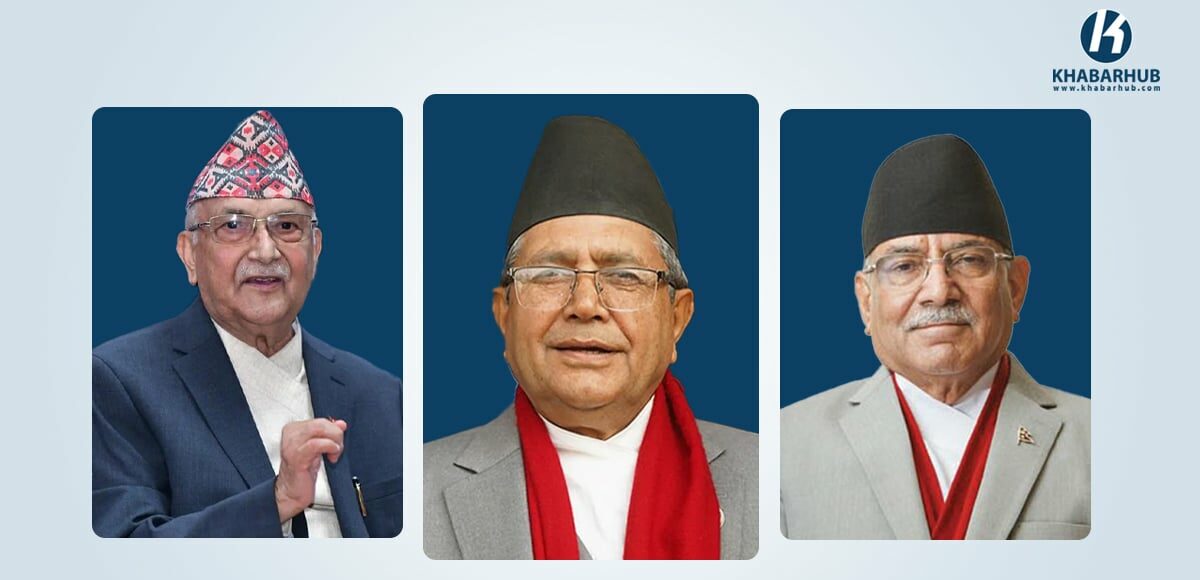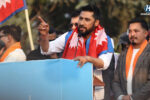KATHMANDU: In a whirlwind of political maneuvering, Prime Minister (PM) Pushpa Kamal Dahal ‘Prachanda’ made waves in Kathmandu’s political landscape.
Breaking ties with the Nepali Congress onMarch 4, 2024, he aligned himself with the CPN-UML.
However, after the 2079 BS election, CPN-UML Chairman KP Oli played a crucial role to break between Nepali Congress and the Maoist Center.
Despite joining forces with the UML, Prime Minister Dahal maintained a soft stance towards the Nepali Congress, earning a vote of confidence even from them on January 10, 2023.
This softening stance towards Nepali Congress irked Oli, leading to a growing divide between him and Dahal, especially on issues concerning Nepali Congress.
When the presidential election loomed, Prachanda strategically sidelined the CPN-UML and allied once again with the Nepali Congress, sidelining UML to the opposition bench.
Even though Prachanda fought the 2079 election alongside the Nepali Congress, his alliance with them was short-lived.
The Prime Minister expressed his frustration with the Nepali Congress following the tumultuous House of Representatives meeting, which was marred by slogans demanding the formation of a committee.
Shortly after assuming office as Prime Minister on December 25, 2022, with support from various parties including the UML, Prachanda sought and secured a vote of confidence from the Nepal Congress on January 10, 2023.
The Nepali Congress, despite being the main opposition, backed Prachanda, hoping for a return to a liberal stance despite his recent alliance with the UML. Prachanda reciprocated this gesture by aligning with the Nepali Congress for the presidential election, effectively sidelining the UML once again.
Expressing his preference for Nepali Congress President Sher Bahadur Deuba over Oli, Prachanda ensured the victory of Ram Chandra Poudel of in the presidential race with the support of the Congress.
However, the alliance between Prachanda and the UML was short-lived, as on March 4, he realigned with the UML, severing ties with the Nepali Congress.
Yet, the relationship between Nepali Congress and Prime Minister Prachanda has since soured, marking a departure from their previously ‘comfortable’ alliance.
The intricate web of alliances continues to shape Kathmandu’s political landscape, leaving observers intrigued by the ever-shifting dynamics of power.
Since March 19, the Nepali Congress has staged protests in both houses of the Federal Parliament, demanding a parliamentary inquiry committee.
They allege that Deputy Prime Minister and Home Minister Rabi Lamichhane was involved in a cooperative fraud case.
Initially, Prime Minister Prachanda appeared accommodating towards the Congress’s demands, expressing willingness to work together.
In response to Congress’s demands, he proposed forming a parliamentary committee to investigate the cooperative fraud case.
To facilitate this, Prime Minister Prachanda established a four-member task force led by Law Minister Padam Giri on May 18.
Their mandate was to outline the scope and terms of reference for the proposed parliamentary committee.
However, tensions arose between Prime Minister Prachanda and the ruling partner UML Chairman KP Oli over the composition of the parliamentary committee.
Oli, in consultation with Home Minister Rabi Lamichhane and Speaker Devraj Ghimire, explored alternatives to the committee.
Taking to social media platform X (Twitter) during the Prime Minister’s vote of confidence, he wrote, “I didn’t see the Speaker in Parliament today. What I see is a bleak image, where someone tarnishes dignity by acting merely as a rubber stamp.”
In recent days, Oli, Ghimire, and Lamichhane held frequent meetings. During these discussions, Speaker Ghimire indicated willingness to align with the government’s position.
Prime Minister Prachanda also endorsed Oli’s strategy to counter the Congress’s demand for a parliamentary committee.
Furthermore, Prachanda delivered a stern warning to the opposition Nepali Congress on Monday, directly from the Parliament floor.
He declared, “Nepali Congress has committed grave errors, and it will face consequences.”
The Prime Minister expressed his frustration with the Nepali Congress following the tumultuous House of Representatives meeting, which was marred by slogans demanding the formation of a committee.
“Today, the Nepali Congress has done a great disservice. I, who have extended my support to you on numerous occasions, who have endeavored to steer us towards dialogue and consensus,” lamented Prachanda, “But today, you impeded the very same Prime Minister in the vote of confidence, obstructed my path.”
He went on to condemn the Nepali Congress’s actions on Monday, declaring them as a blot on Nepal’s history.
“Your conduct today will be etched as a stain in Nepal’s annals,” he asserted, “One day, you will be held accountable for your deeds.”
While opposition parties in the federal parliament agreed on the necessity of forming a parliamentary committee to probe the cooperative fraud case, there appeared to be unanimity among the government’s leadership, the Speaker, and UML Chairman Oli in defense of Home Minister Lamichhane, implicated in the case.
Despite appearing receptive to dialogue with the Nepali Congress, PM Prachanda, like UML Chairman Oli and Speaker Ghimire, displayed hesitancy towards establishing a parliamentary committee.
This stance has exacerbated polarization between the government, ruling parties, and the main opposition.
With Prime Minister Prachanda pressing ahead with a vote of confidence in Parliament on Monday, despite opposition from the Nepali Congress, the likelihood of presenting the budget has grown.
In response, the Nepali Congress accused the government of shirking responsibility and showing insensitivity towards democratic principles, parliamentary norms, and decorum.
Speaking to journalists at the Parliament Building premises, UML chief whip Mahesh Bartaula asserted that the Nepali Congress’s undemocratic tendencies had been laid bare.
“Today, the Speaker even denied the opposition the opportunity to speak. The ruling party, in its majority, stands behind the Speaker’s decision to muzzle the opposition,” lamented Nepali Congress Chief Whip Ramesh Lekhak during a press briefing on Monday, “This autocratic attitude within the ruling party reinforces the government’s disregard for democracy and parliamentary values.”
Furthermore, Nepali Congress General Secretary Bishwa Prakash Sharma noted the absence of the Speaker but a bleak image from Monday’s parliamentary session.
Taking to social media platform X (Twitter) during the Prime Minister’s vote of confidence, he wrote, “I didn’t see the Speaker in Parliament today. What I see is a bleak image, where someone tarnishes dignity by acting merely as a rubber stamp.”
Gyanendra Bahadur Shahi, the chief whip of the Rastriya Prajatantra Party (RPP), criticized Speaker Ghimire, stating that Ghimire seemed more like a party worker than a Speaker.
Speaking to the media following the House of Representatives meeting on Monday, Shahi expressed disappointment that Ghimire did not fulfill his role as Speaker.
“Today, we did not witness the Speaker; instead, we saw a man taking directions from his party while seated in the chair. We saw a party worker occupying that position,” he remarked.
Similarly, Rastriya Janamorcha Chairman Chitra Bahadur KC also voiced dissatisfaction with the Speaker’s performance in Parliament.
KC remarked on the Speaker’s unsatisfactory role following the House of Representatives meeting.
Speaker KC, presiding over the parliamentary proceedings amidst opposition protests, expressed discontent with the Speaker’s conduct.
He accused the Prime Minister of contributing to instability, citing four instances within 16 months.
Meanwhile, the the UML said that the undemocratic nature of the Nepali Congress has been exposed.
Speaking to journalists at the Parliament Building premises, UML chief whip Mahesh Bartaula asserted that the Nepali Congress’s undemocratic tendencies had been laid bare.
He further stated that the Congress should cease branding itself as a democratic party.
“The ruling party seeking a vote of confidence while the opposition protests is not conducive to the norms of parliamentary governance,” Gyawali asserted.
“The actions of the Nepali Congress in Monday’s House of Representatives meeting have confirmed its undemocratic nature. Henceforth, the Congress should refrain from portraying itself as democratic,” remarked Bartaula.
“Activities undermining parliamentary dignity pose a significant risk to the Congress and will result in considerable losses for the party,” he added.
What experts view
Political analyst Geza Sharma Wagle suggested that Prime Minister Prachanda, Speaker Ghimire, and UML Chairman Oli are undermining the parliamentary system’s credibility.
“It appears Oli and Prachanda are attempting to discredit parliamentary democracy by manipulating the Speaker’s position,” he remarked.
Wagle argued that given the events of Monday in Parliament, smooth relations between Prime Minister Prachanda and the Nepali Congress seem unlikely.
He criticized PM Prachanda’s perceived inconsistency, stating, “Prachanda has displayed a dual character and double standards from the outset. His allegiance seems to sway between Nepali Congress and UML, driven solely by a thirst for power.”
Wagle believed Prachanda’s true colors have now been exposed, diminishing prospects for a harmonious relationship with Nepali Congress.
Wagle advised that despite granting Prime Minister Prachanda the benefit of the doubt, the Nepali Congress should abandon any illusions about him.
Similarly, constitution expert Chandrakanta Gyawali contended that Monday’s events in Parliament do not align with the political culture expected within a parliamentary system.
“The ruling party seeking a vote of confidence while the opposition protests is not conducive to the norms of parliamentary governance,” Gyawali asserted.
He criticized Prime Minister Prachanda’s decision to pursue a vote of confidence under such circumstances, stating, “It is inappropriate for the ruling party to seek a vote of confidence when faced with opposition protests.”
Gyawali emphasized the importance of the ruling party addressing opposition concerns during parliamentary sessions.
“Even if the opposition raises just one question, the ruling party should provide a response,” he emphasized, advocating for the Speaker to enforce this principle.









Comment